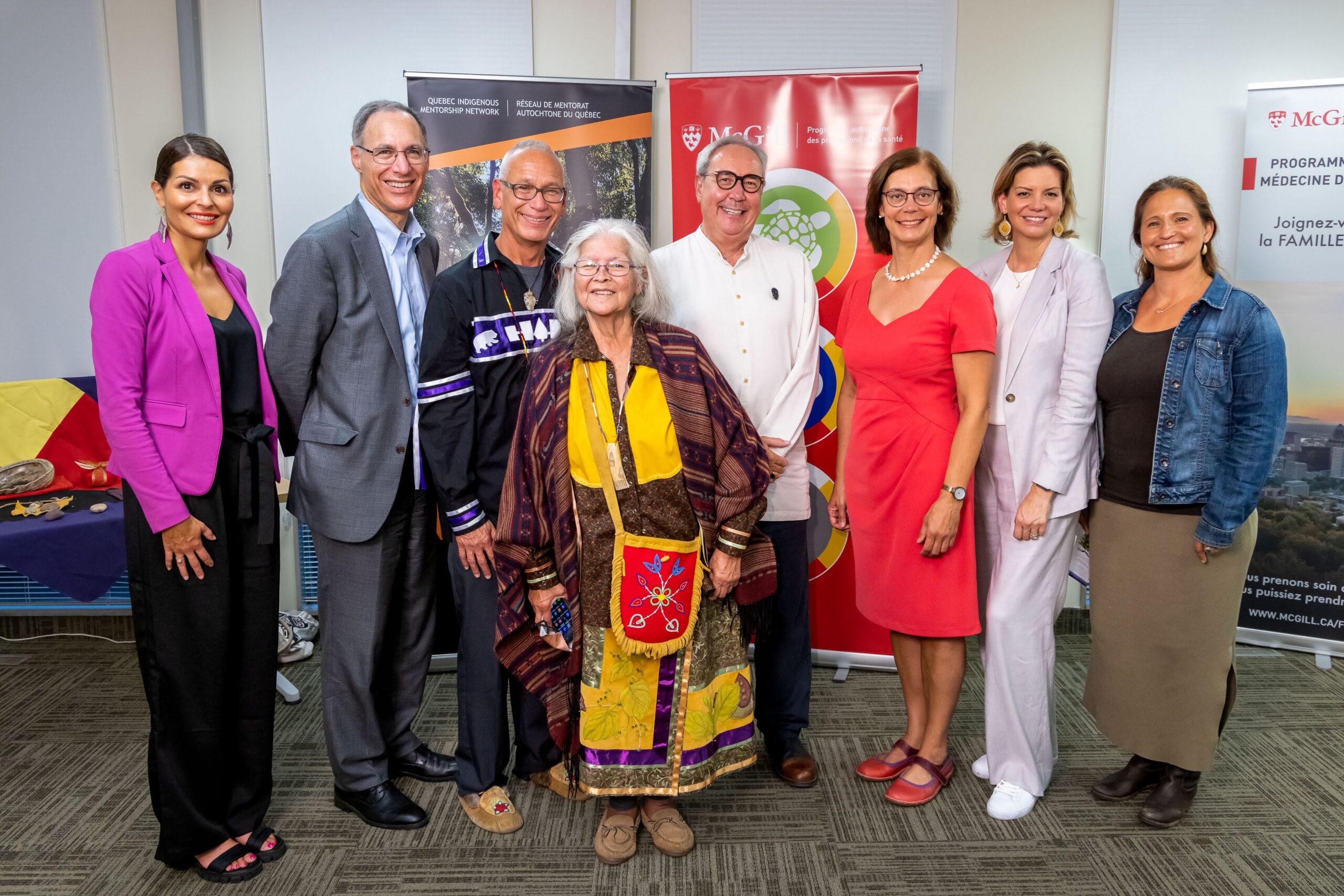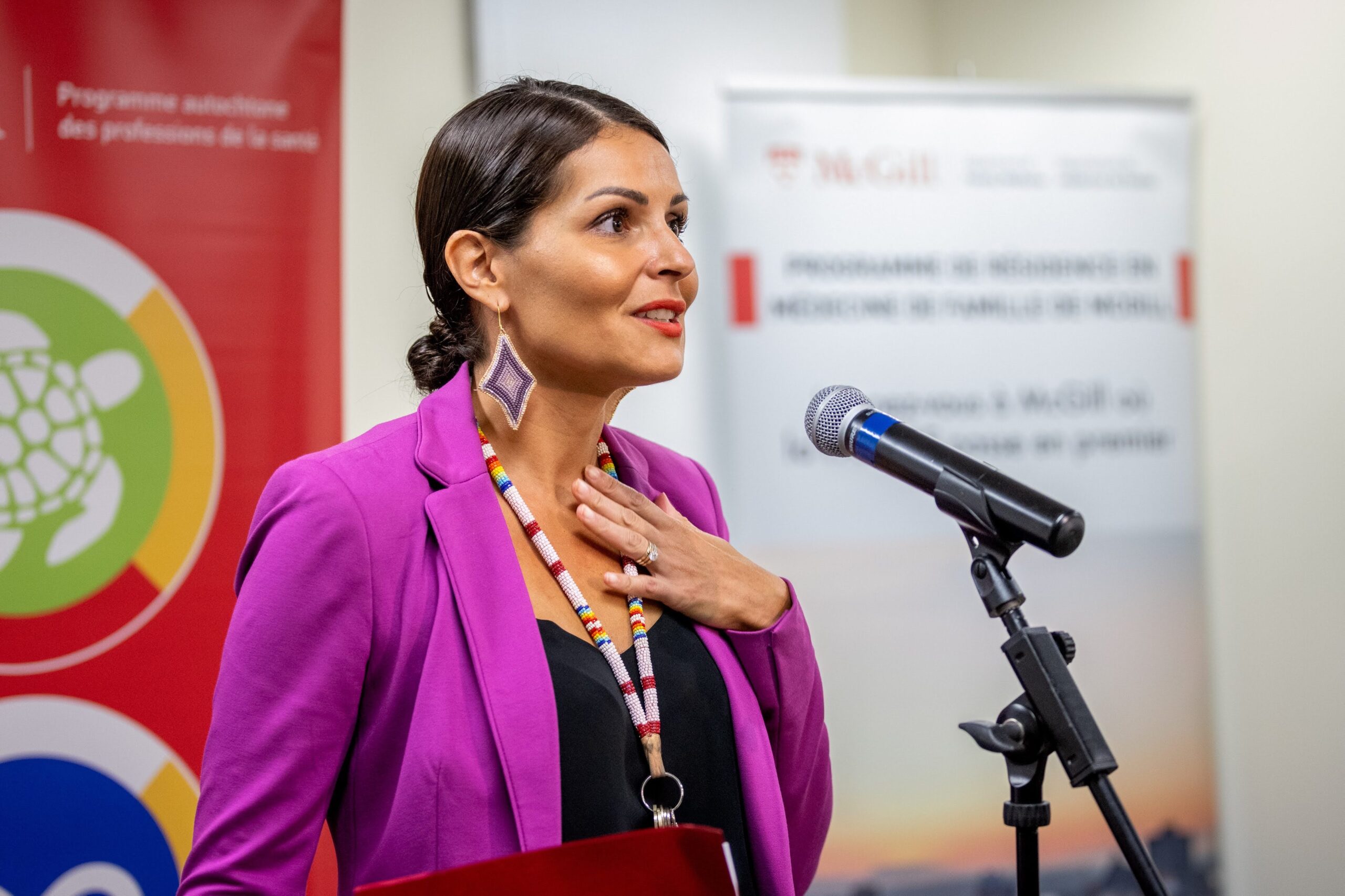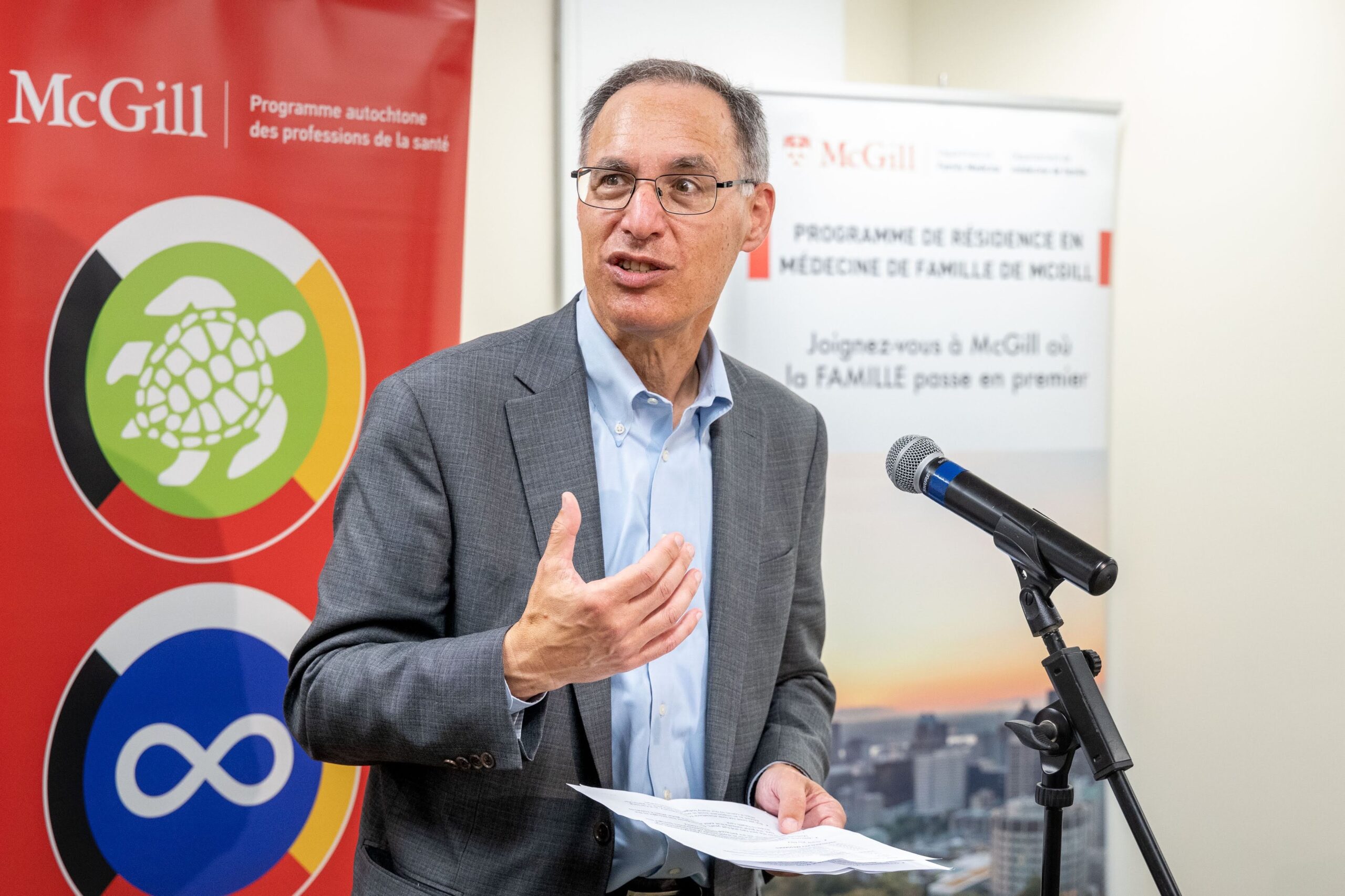
Representatives of local Indigenous organizations were among those in attendance on the evening of September 13, for the official opening of the Indigenous space at McGill’s Department of Family Medicine. This brand-new space, dedicated to activities around Indigenous Health and community outreach within the health sector, is the first of its kind at McGill.
“We come together to celebrate and to share our thoughts. We acknowledge our relations who provide for us, who have put the earth here, and who provide for our food. We acknowledge their roles,” said Alex McComber, a professor at the Department of Family Medicine, Kanien’keha:ka, (People of the Flint, Mohawk), Bear Clan from Kahnawake Territory, the master of ceremonies for the evening.
McComber introduced the event’s first guest speaker, Amelia Tekwatonti McGregor, Kanien’keha:ka, an Elder from his community who shared traditional protocol, offering Ohenton Kariwatehkwen/ The Words That Come Before All Else in the Mohawk language.
McGregor was followed by the mother and daughter duo Nina and Sierra Segalowitz who captivated the audience with their Inuit throat singing, which included songs about the river, as well as a love song performance.
Commitment to inclusivity
“This event is a testament to McGill’s strong commitment to making its campuses inclusive, welcoming and successful places for scholars and students in First Nations, Inuit and Métis communities,” said Celeste Pedri-Spade, Ojibwe, McGill’s recently appointed first Associate Provost of Indigenous Initiatives. “Today’s inauguration of the Department of Family Medicine’s Indigenous space is perfectly aligned with our calls to action which calls our University to provide suitable cultural spaces for Indigenous students, staff and Faculty and suitable living and study environments for Indigenous students.

“Physical representation and symbolic recognition are so very important,” continued Pedri-Spade. “It is imperative that we find ways to transform the spaces and places where we come together to learn, in ways that First Nations and Inuit and Métis people see themselves reflected within.”
Dr. David Eidelman, Vice-Principal (Health Affairs) and Dean of the Faculty of Medicine and Health Sciences noted the leading role that the Department of Family Medicine has played over the years. “It is not surprising to me that it is the Department of Family Medicine that has taken the lead here in creating an Indigenous space. The Department of Family Medicine has really championed primary care in our faculty and taken it from where it was as an after-thought when I was a student here to where it is now which is front and center in what we do,” he said.
“We hope that with these gestures and with these efforts, we go at least a small way towards making a difference and trying to get closer to Indigenous communities and recognizing their importance, and contribution and relationship with the land that we’re on.”
Integrating Indigenous ways of knowing with western academia
Dr. Marion Dove, Chair of the Department of Family Medicine, described the purpose and the vision for the Indigenous space. “We are planning to have this space be the location of scholarship on Indigenous health. We want it to be a focus in integrating Indigenous ways of knowing into the western academic world,” said Dove who also added some words of thanks to Professor Neil Anderson, Dr. Howard Bergman, and Nathalie Moragues for supporting the operations behind this space.
“We want it to be a place to maintain Indigenous traditions through a program which will include things like kitchen table conversations, fireside chats, storytelling, film-viewing, and I’m really looking forward to all these activities,” said Dove.

Richard Budgell, Inuk, professor at the Department of Family Medicine explained some of the design elements behind the space and the type of education that will be taking place here. “The diverse Indigenous communities helped us build the space in a way that is welcoming and comfortable. The educational approach is egalitarian and wholistic,” he said. “We hope this space will succeed and be full of life and energy, but the work doesn’t stop today, the work starts today.”
Professor Budgell shared his aspirations to reconceptualize medicine and health by bringing in Indigenous perspectives. He introduced the audience to an Inuit health and wellbeing concept called Inuuqatigiitsianiq, which refers to harmonious relations among people who share a place.
“There is a revolution taking place in this Department and in this Faculty to reconceive health in ways that meet the cultures of the people who are so frequently maltreated in healthcare systems,” said Budgell. “We have a direct role to train people who treat many Indigenous People in Quebec from Nunavik, to the Cree territory, from the urban center here in Montreal and surrounding areas.”
“A huge change from when I was here 30 years ago”
Dr. Ojistoh Horn, Kanien’keha: ka, spoke her experience as a McGill grad and her current work as an obstetrician. “We’re seeing our healthcare system fall apart in front of us after COVID. In small communities like in Akwesasne, the healthcare system is broken, the infrastructure is unstable, and we have a huge problem with human resources,” said Horn. “To be able to support, not just doctors, but all those people who support doctors, when they finally leave, is important. I want to see how we can support doctors when they leave to work in our communities, to provide wholistic care.
“One thing that was obvious during my education was that I was the only Indigenous person I ever saw,” continued Horn. “It was quite a lonely experience. To be in a place right now that is dedicated to the Indigenous voice is incredible. It’s a huge change from when I was here thirty years ago.”
Dr. Jennifer Robinson, Algonquin, is a resident physician at St. Mary’s Hospital who shared some of her expectations of this space. “We have a responsibility to develop protocols around how we’re going to use this space, and we have the right to implement practices that are responsive to the needs of Indigenous communities. We must bring the future generation to any significant event like this one, so they remember and so we can be accountable to them,” she said.
“It isn’t that long ago that a First Nations person could not become a doctor without being disenfranchised. It’s incredible that I am here with one of the few First Nations doctors working within the community who is imparting her knowledge to me. As a First Nations person, I can see myself in another doctor for the first time.”

Congratulations to all the persons who have worked very hard for this dedicated space.